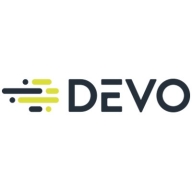

After comparing Sumo Logic Security and Devo, they fall under the category of security analytics solutions. Devo appears to have the upper hand due to its robust features and better user satisfaction.
Features: Sumo Logic Security is noted for its integration capabilities, providing seamless connections with other tools. It features a user-friendly interface and competitive pricing, making it accessible for a broader audience. Devo offers advanced analytics, comprehensive data management, and extensive analytical capabilities, which gives it an edge in features.
Room for Improvement: Sumo Logic Security needs more customizable dashboards, enhanced alerting mechanisms, and improvements in response time. Devo users suggest better initial setup documentation, more intuitive navigation, and streamlined user management. Both need specific functionality enhancements based on user feedback.
Ease of Deployment and Customer Service: Sumo Logic Security has a straightforward deployment process and strong customer support, but some users find it time-consuming. Devo provides faster deployment and proactive customer service, leading in this aspect by offering a quicker and more supportive experience.
Pricing and ROI: Sumo Logic Security is cost-effective and delivers good ROI with its pricing structure. Devo, perceived as more expensive, justifies the higher costs through superior features and capabilities, leading to better returns according to user feedback.
They have a response time of forty-eight hours, which is not instant support.
In general, they usually provide continuous support post-implementation, being in touch and trying to help, which makes their after-sale process better than Splunk.
The tool has high scalability because everything is based in the cloud.
I did not face any significant issues with Sumo Logic Security, but the pricing may be a concern as they try to upsell and raise the prices very quickly.
If there are many records, the system may stop or the UI may become unresponsive.
The query language is pretty straightforward and easy, and it is very powerful for building different searches and dashboards that will serve for later exploration of the same interests I have.
Integrations with other sandboxes could be improved to better interpret data using AI and machine learning models.
This can lead to alerts that are collections of disjointed signals that sometimes make no sense and lack real context; this simplistic approach makes it hard to find coherent stories during investigations.
The correlation rules and log mapping are not as mature compared to other SIM tools like Splunk.
I would also appreciate the AWS automation integrations to be more secure because currently, they are using access keys, which involves a user rather than roles, which is the security best practice recommended by AWS.
This makes it more cost-effective because other solutions often include a third element in their pricing.
When they see a spike in a line chart for a failed login, which could be a true or false attempt, they can click that spike, and a table widget on the same active board instantly populates with raw logs of data for those specific failed logins.
The features I find most useful in Sumo Logic Security are the ease of implementation and connectors; they have a very easy connection and many connectors to important systems, making it very easy to implement and fast to start running in production.
They are able to save time on fewer alerts because we are able to perform tuning on the logs to be able to only get relevant or security relevant incidents.
If we cannot find the data in other tools, like email security or NDR, we can fetch those logs in the Log Analytics platform of Sumo Logic.
| Product | Market Share (%) |
|---|---|
| Devo | 1.1% |
| Sumo Logic Security | 1.3% |
| Other | 97.6% |
| Company Size | Count |
|---|---|
| Small Business | 8 |
| Midsize Enterprise | 4 |
| Large Enterprise | 11 |
| Company Size | Count |
|---|---|
| Small Business | 6 |
| Midsize Enterprise | 4 |
| Large Enterprise | 13 |
Devo is the only cloud-native logging and security analytics platform that releases the full potential of all your data to empower bold, confident action when it matters most. Only the Devo platform delivers the powerful combination of real-time visibility, high-performance analytics, scalability, multitenancy, and low TCO crucial for monitoring and securing business operations as enterprises accelerate their shift to the cloud.
Sumo Logic
Sumo Logic is a cloud-based machine data analytics company focusing on security, operations, and BI use cases. It provides log management and analytics services that leverage machine-generated big data to deliver real-time IT insights.
Sumo Logic is developed as a SaaS solution, it processes and analyzes large quantities of IT infrastructure data, spotting patterns and anomalies that can indicate a potential threat or significant event.
The platform is designed to help IT, security, and business operations teams develop, manage, and secure their applications and cloud infrastructures. It collects, aggregates, and analyzes data from various sources including servers, virtual machines, and network devices, providing visibility into complex systems.
What are the key features of Sumo Logic?
Real-time Analytics: Continuous queries and live dashboards that provide insights into application performance, user behavior, and security threats.
Advanced Machine Learning: Utilizes machine learning algorithms to identify trends, anomalies, and patterns.
Integrated Threat Intelligence: Tools and workflows to enhance security postures by detecting threats and anomalies.
Multi-tenant Cloud Service: Allows users to operate in a shared cloud environment securely.
The solution aims to simplify data complexity, streamline operations, and provide actionable insights to businesses across various industries.
Sumo Logic is designed to handle high data volumes from multiple sources without diminishing performance. It is primarily deployed in the cloud with seamless integrations for AWS, Google Cloud, and Microsoft Azure. This flexibility allows users to leverage Sumo Logic’s capabilities regardless of their existing cloud infrastructure.
In summary, Sumo Logic is a comprehensive, AI-driven analytics solution ideal for businesses looking to enhance their IT and security operations through data-driven insights and real-time monitoring. Its flexible deployment options and scalable pricing model make it accessible for various business sizes and sectors.
We monitor all Security Information and Event Management (SIEM) reviews to prevent fraudulent reviews and keep review quality high. We do not post reviews by company employees or direct competitors. We validate each review for authenticity via cross-reference with LinkedIn, and personal follow-up with the reviewer when necessary.